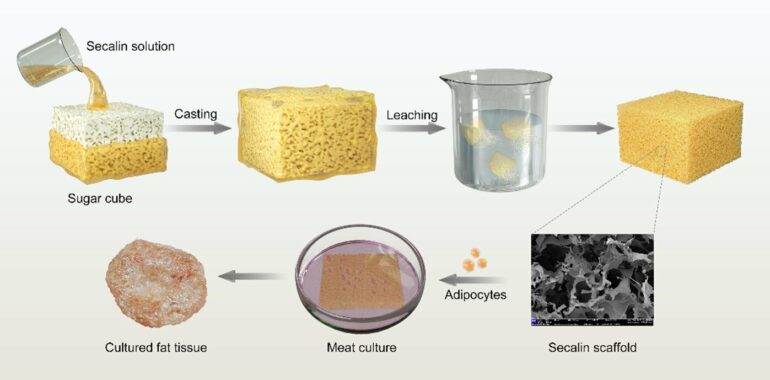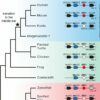National University of Singapore (NUS) food scientists have developed a simple and scalable method for culturing pork fat tissue using protein scaffolds made from secalin, a protein extracted from rye.
Cellular agriculture offers a sustainable alternative to conventional meat production but faces significant technological challenges. One key technical bottleneck for the large-scale commercialization of cultured meat is the lack of edible and functional scaffolds that meet requirements for scalability, cost and safety.
A research team led by Professor Huang Dejian from the NUS Department of Food Science and Technology discovered that rye secalin, an abundant crop protein, is suitable for edible scaffolding materials. They invented a template-leaching method for making scaffolds from secalin. This process is fully food-grade, cost-effective and sustainable, producing secalin scaffolds with high porosity and ideal mechanical rigidity for pork fat cell growth.
The research findings were published in the Journal of Agricultural and Food Chemistry.
This patent-pending technology overcomes the bottlenecks of scaffold manufacturing in terms of cost, functionality and scalability. The discovery presents a new direction for the cellular agriculture sector.
In this work, common sugar cubes were used as highly permeable templates to prepare sponge-like secalin scaffolds. These protein scaffolds featured a high porosity of approximately 90%, high water stability and optimal mechanical properties (below 3 kPa) for adipose tissue culturing.
Adipose tissue is an essential component of meat that contributes to meat-specific juicy flavor, texture, and nutritional values. After 12 days of culturing porcine adipose cells, the resulting pork fat tissue closely resembled conventional pork subcutaneous adipose tissue in appearance, texture, flavor and fatty acid profiles.
By customizing larger sugar cubes, the scale-up fabrication of secalin scaffolds can be achieved. Additionally, the research team is exploring a differentiation medium containing efficient, food-grade ingredients to control the fatty acid composition and enhance the nutritional value of cultured pork fat.
Prof. Huang said, “Cereal prolamins are promising natural sources for scaffold development, and they can be reclaimed from spent grains such as spent barley grains generated locally. Our simple and green method using sugar cubes as templates should facilitate the scaled production of edible scaffolds for cultured meat while contributing to the local sustainable and circular economy.”
More information:
Lingshan Su et al, 3D Porous Edible Scaffolds from Rye Secalin for Cell-Based Pork Fat Tissue Culturing, Journal of Agricultural and Food Chemistry (2024). DOI: 10.1021/acs.jafc.3c09713
Provided by
National University of Singapore
Citation:
Cellular agriculture research manages to culture pork fat tissue on rye protein scaffolds (2024, October 3)



